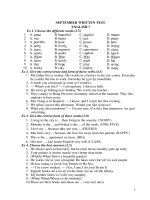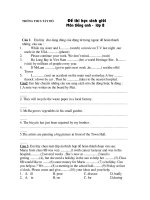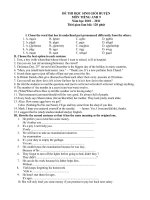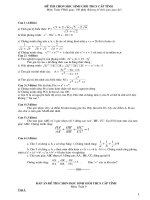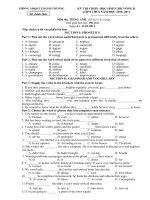ĐỀ THI HSG SỐ 3 ANH 9 PHÙ MỸ
Bạn đang xem bản rút gọn của tài liệu. Xem và tải ngay bản đầy đủ của tài liệu tại đây (256.42 KB, 9 trang )
Tµi liÖu ®uîc cung cÊp bëi: Violet.vn/tnh-ptk1018
PHÒNG GIÁO DỤC – ĐÀO TẠO PHÙ MỸ
TRƯỜNG THCS MỸ THÀNH
ĐỀ THI ĐỀ NGHỊ
KỲ THI CHỌN HỌC SINH GIỎI KHỐI 9 CẤP HUYỆN
NĂM HỌC : 2010-2011
Môn: TIẾNG ANH
Phân môn: ĐỌC HIỂU VÀ VIẾT
THỜI GIAN LÀM BÀI 140 PHÚT
Tµi liÖu ®uîc cung cÊp bëi: Violet.vn/tnh-ptk1018
PHÒNG GD-ĐT PHÙ MỸ KỲ THI CHỌN HỌC SINH GIỎI KHỐI 9 CẤP HUYỆN
TRƯỜNG THCS MỸ THÀNH NĂM HỌC: 2010 – 2011
ĐỀ THI MÔN TIẾNG ANH
Phân môn: ĐỌC HIỂU, VIẾT
Thời gian làm bài 140 phút
( Không kể thời gian giao đề )
ĐỀ ĐỀ NGHỊ oOo
A/- READING ( 12,0 ms )
Part 1: Choose the best answer to complete each of the following sentences. (2,0 ms)
1. Do you object to …… the door?
A. my opening B. open C. that I open D. to have open
2. It was waste of time studying Latin at school. I wish I …… it.
A. didn’t study B. hadn’t studied C. wouldn’t study D. wasn’t studying
3. I haven’t got much homework. …… it by 8.00 o’clock.
A. I do B. I’ll have do C. I have done D. I am going to do
4. …… a party here next Sunday.
A. We have B. We are about to have C. We are having D. We will have
5. All the students …… knowing anything about the matter.
A. apologized B. denied C. promised D. refused
6. Do you happen to know ……?
A. of whom this watch is B. whose watch is this
C. whose watch this is D. this watch of whose
7. I went on an excursion with a group of tourists, …… were from America.
A. many of whom B. many of them C. many of which D. many of that
8. I remembered …… the letter a few days before going on holiday
A. to receive B. receiving C. received D. to have received
9. Children hardly study at home, ……?
A. do children B. don’t children C. do they D. don’t they
10. …… that book, I’d have given it to my girlfriend in Qui Nhon City.
A. If had I bought B. Had I bought C. I had bought D. If I bought
Part 2: Read the following passage then decide whether the following statements are true (T)
or False (F). If the information is not given, write N. (0,5 m)
Example: 0 N
A combination of sewage, salt, air pollution, sun, sand and wind may destroy the huge
statue on the outskirts of Cairo. This statue of the sun god has the body of a lion and the face of a
human being. It is five thousand years old, but it is too badly damaged to be completely saved.
The statue has already been dug out of the sad three times. However, the latest problems
are much more serious. First, there are no proper drains and water pipes in the neighborhood and
the underground passages round the statue have become blocked. Too much water has been
running into the stone statue for several years. As a result, tiny pieces of salt have been left on the
stone and have damaged it.
Secondly, air pollution from the increasing amount of traffic in Cairo is also destroying the
ancient statue. The air is so full of poisonous gases that it is making the stone crumble and decay
even faster.
Thirdly, the statue is being damaged by extremes of temperature. For example, although
the air is very cold at night, during the day the stone of the statue becomes very hot under the
strong sun. Other natural forces such as serve sandstorms also attack the statue.
Tµi liÖu ®uîc cung cÊp bëi: Violet.vn/tnh-ptk1018
Finally, the tourists who visit the statue everyday also cause a lot of damage.
0. The statue of the sun god was built for religious reasons.
1. The statue is in the center of Cairo.
2. Part of the statue looks like a lion and part like a person.
3. The underground passages round the statue are full of waste and water.
4. High temperatures damage stone far more than low temperature.
5. Fortunately, little damage is caused by visitors to the statue.
Part 3: Choose from sentences A-H the one fits each gap 1-5. There are two extra sentences
you do not need to use. (0,5 m)
A. Industries have polluted the water, fishing has destroyed sea life and drivers have
damaged large parts of the coral.
B. The crew were helpful and pleasant and the price was also very reasonable.
C. Altogether, it was a wonderful trip.
D. I’m not sure I would go again.
E. It stretches for 200 kilometers and is up to 800 meters wide.
F. However, I didn’t think I could take part in a dive cruise and not dive.
G. At no point were we permitted to swim away on our own.
H. I was right it was an incredible.
Example: 0 - H
When I was asked to visit and write about the Great Barrier Reef, I was thrilled. I had heard
reports of damage done by tourism and other industries, but felt that the Reef would still be a
wonderful place to see. ……(0)……
From the air, the Great Barrier Reef seems huge. (1)…… I wasn’t sure how best to explore
such a giant place, so after I had landed, I made enquiries and was told the best way to see the
Reef is to take a dive cruise. I booked a place on a three-day cruise, and, despite warnings about
the state of some of these boats, the boat I was on was comfortable and clean. (2)…… I was
entitled to eight dives plus use of wet suit, flippers and other equipment, three meals a day and
two nights’ accommodation.
Although I have been diving before, I am not an experienced diver. (3)…… I was nervous to
begin with, but soon felt completely safe. They were divided into groups according to our ability
and each group was given an instructor. They had very strict rules. (4)…… With our guides, we
saw some amazing sea life including small sharks, crabs and thousands of colorful tropical fish
swimming around in the coral. The other divers were friendly and the evenings on board were
very pleasant. (5)……
Part 4: There are eleven mistakes in the following passage. Find and correct them. There is an
example for you. (2,0 ms)
Example: 1. said say
Sometimes people add to what they said even when they don’t talk. Gestures are the
“silent language” of every cultures. We point a finger or move another part of the body showing
what we want to say. It is important to know the body language of every country or we may be
understood.
In the United States, people greet each other by a handshake in a formal introduction. The
handshake must be firm. If the handshake is weakly, it is a sign of weakness or unfriendly.
Friends may place a hand on the other’s arm or shoulder. Some people, usually women, greet a
friend with a hug.
Space is important to Americans. When to people tell to each other, they stand two and a
half feet away at an angle, when they are not facing each other directly. Americans get
Tµi liÖu ®uîc cung cÊp bëi: Violet.vn/tnh-ptk1018
comfortable when a person stands too close. They will move back to have their space. If
Americans touch another person by accidence, they say, “Pardon me.” Or “Excuse me.” …
Part 5: Read the passage carefully then do the exercise below. (1,0 m)
Here are some ways of learning vocabularies and grammar in foreign language. Some use
a notebook. They write the sentences with new words on it at least three or four times a week.
Then they try to translate into Vietnamese and study it everywhere because it is a pocket book.
The other ones write words in groups with the same kind of meaning or words of the same kind
of grammar. Many learners write new words from the last lessons on little bits of paper and stick
everywhere in the house like on the mirror, on the room door, on the wall of the study room,
beside the bed, next to the dinning tale. They see them in free time at home. Other write the new
words on small piece of paper with the English on one side and Vietnamese on the other side.
They put on whole sentences with the words to understand them with the words around. They put
the paper in their pocket and read it while waiting something or someone, sitting in the bus,
having break time in class. They mark the known words and study the rest next time.
In case having a walkman, some students read and record the new words with their
meaning in the tapes. They listen to them on the bus, in the house works, or at anytime they have
activities.
Complete the summary below. Use only ONE WORD from the text for each space.
Example: 0 - learning
In the text, students study not only ways of ……(0)… vocabularies, but also the way of
putting them in order. There are five kinds of learning …(1)… languages in the text. They write
new words on a …(2)… another two days a week. The other ones write words in words of the …
(3)… function. Many learners write vocabularies from the last lessons. Others write the new
words on small …(4)… with the English on one side and Vietnamese on the other side. They
write the complete idea with the words to understand them with the words around. They put the
paper in their pocket and read it when they have …(5)… time.
Part 6: Complete each space with the correct form of one of the verbs given in the list.
Remember that there are more verbs than needed. (1,0 m)
be come buy collect bring leave look get
want make have not see decorate live show move
Yesterday afternoon, Tom …(1)… a letter from his sister, who lives in Canberra. He …(2)
… her since she …(3)… to Australia. Through her letter, Tom knows that she is coming to
England next year. If she …(4)…, she …(5)… a surprise. Tom and his family are now living in a
beautiful new house in the country. The house …(6)… completed five months ago. Tom …(7)…
her to stay with his family. The house has many large rooms which are well-decorated. He wants
to …(8)… her everything he …(9)… recently. He thinks she will be pleased to see the lovely
garden behind the house. It is a very modern house, so it …(10)… strange to some people. It
must be the only modern house in the district.
Part 7: Read the passage below and then decide which word best fits each space. (2,0 ms)
Example: 0 ………rivers…………
We are all slowly destroying the earth. The seas and …(0)… are too dirty to …(1)… in.
There is so much smoke in the air that it is unhealthy to live in …(2)… of the world’s cities. In
one well-known city, for example, poisonous gases …(3)… cars pollute the air so much that
traffic policemen have to …(4)… oxygen masks.
Tµi liÖu ®uîc cung cÊp bëi: Violet.vn/tnh-ptk1018
We have cut down …(5)… many trees that there are now vast of wasteland all over the
world. As a result, farmers in parts of Africa can not grow …(6)… to eat. In certain countries in
Asia there is too …(7)… rice. Moreover, we do not take enough care of the countryside. Wild
animals …(8)… quickly disappearing. For instance, tigers are rare in India now ……(9)… we
have killed too many for them to survive. However, it isn’t enough simply to talk about the
problem. We must act now before it is too ………(10)…… to do anything about it. Join us now!
Save the Earth! This is too important to ignore.
Part 8: Read the text below and then decide which word(s) below best fits each space. (1,0 m)
Example: 0 C
The Rockies Mountains run almost the length (0)… North America. They star in the
North-West, but lie only a (1)… hundred miles from the center in more southern areas. Although
the Rockies are smaller than (2)…… the Alps, they are no less wonderful. There are many roads
across the Rockies, (3)…… the best way to see them is to (4)……by train. You start from
Vancouver, (5)……most attractive of Canada’s big cities. Standing with its feet in the water and
its head in the mountains, this city (6)……… its residents to ski on slopes just 15 minutes by car
from the city (7)… Thirty passenger trains a day used to (8)…… off from Vancouver on the
cross-continent railway. Now there are just three a week, but the ride is still a great adventure.
You sleep on board, (9)… is fun, but travel through some of the best (10)… at night.
0. A. in B. down C. of D. through
1. A. many B. lot C. few D. couple
2. A. from B. to C. as D. than
3. A. but B. because C. unless D. since
4. A. drive B. travel C. ride D. pass
5. A. a B. one C. the D. its
6. A. lets B. allows C. offers D. gives
7. A. center B. circle C. middle D. heart
8. A. leave B. get C. take D. set
9. A. when B. which C. who D. where
10. scenery B. view C. site D. beauty
Part 9: Read the following passage then do the tasks below. (0,5 m)
“Just stop buying books! We haven’t got the room and beside it is a waste of money”, said
practical Mrs. Johnson to her son David. Why don’t you borrow books from the local lending
library? There you can obtain everything under the sun: fiction, no fiction, science fiction,
detective stories, classics and even the latest best-sellers”.
Life is hard for a bookworm who loves to read quietly and hates being nagged. The
solution to this problem, David thought, is more frequent visits to the local library reading room
where you can browse among all kinds of periodicals, weekly magazine, daily newspapers, film
reviews, even children’s magazines and art books. He had to admit that there was something in
what mother kept saying. There is no sense in amassing expensive books like fat dictionaries,
forty column encyclopedias, handbooks and reference books covering a vast range of subjects,
when they are available in the reference library on open shelves.
Find the word or phrase in the passage that means.
Tµi liÖu ®uîc cung cÊp bëi: Violet.vn/tnh-ptk1018
Example: 0. to get 0. to obtain
1. the key to problems 1. …………………………
2. to use badly or unproductively 2. …………………………
3. books that are sold in great numbers 3. …………………………
4. a person who’s very fond of reading. 4. …………………………
5. To read without definite plan for interest or enjoyment. 5. ………………………
Part 10: Give the correct form of the words in brackets. (0,5 m)
1. Oh, I don’t think it’s a good idea. I …… with you. (agree)
2. If you can give a … explanation for your bad action last night, I’ll forgive you. (reason)
3. It is …… to eat much sugar and fat. (health)
4. It is a contest in which …… have to read two poems in English. (participate)
5. The child should be punished because of his bad …… (behave)
Part 11: Read the passage below and choose the best response to each of the questions.(1,0 m)
The Nobel prizes, awarded annually for distinguished work in chemistry, physics,
physiology or medicine, literature, and international peace, were made available by a fund
bequeathed for that purpose by Swedish philanthropist, Alfred Bernard Nobel. The prizes,
awarded since 1901, are administered by the Nobel Foundation in Stockholm. In 1969, a prize for
economics endowed by the central Bank of Sweden was added. Candidates for the prizes must be
nominated in writing by a qualified authority in the field of competition. Candidates are judged
by Swedish and Norwegian academies and institutes on the basis of their contribution to
mankind. The awards are usually presented in Stockholm on December 10, with the King of
Sweden officiating, an appropriate tribute to Alfred Nobel on the anniversary of his death. Each
prize includes a gold medal, a diploma, and a cash award of about one million dollars.
1. What does this passage mainly discuss?
A. Alfred Bernard Nobel. B. The Nobel Prize
C. Great contributions to mankind D. Swedish philanthropy
2. How often are the Nobel prizes awarded?
A. Five times a year B. Once a year C. Twice a year D. Once every two years.
3. A Nobel prize would not be given to …
A. an author who wrote a novel.
B. a doctor who discovered a vaccine
C. a composer who wrote a symphony.
D. a diplomat who negotiated a peace settlement.
4. Why were the prizes named for Alfred Bernard Nobel?
A. He left money in his will to establish a fund for the prizes.
B. He won the first Nobel Prize for his work in philanthropy.
C. He is now living in Sweden.
D. He serves as chairman of the committee to choose the recipients of the prizes.
5. Why are the awards presented on December 10?
A. Because it is a tribute to the King of Sweden.
B. Because Alfred Bernard Nobel died on that day.
C. Because that date was established in Alfred Nobel’s will.
D. Because the Central Bank of Sweden administers the trust.
B/- WRITING (6,0 ms)
Part 1: Finish each of the following sentences in such a way that it means exactly the same as
the sentence printed before it. (2,0 ms)
1. We couldn’t drive fast because of the frog.
Tµi liÖu ®uîc cung cÊp bëi: Violet.vn/tnh-ptk1018
The frog
2. He asked Jane how she thought of his new shoes.
“How
3. They said that he had written her some letters at school.
Some letters
4. I’ll never lend Robert any more money, no matter what happens.
Under
5. The weather was very bad, so they had to cancel the live show.
So
6. I wish I hadn’t told him what we were planning to do this evening.
I regret
7. It’s extremely difficult for us to make ends meet these days.
We find
8. Sally is the cleverest student in the class.
Nobody
9. He got down to writing the letter as soon as he returned from his work.
No sooner
10. I would love to be rich and famous.
If only
Part 2: Using the words given and other words, complete the second sentence so that it has a
similar meaning to the first sentence. Do not change the word given. (1,0 m)
1. I read about the closure of the factory only yesterday. (until)
It the closure of the factory.
2. Nobody apart from my mother thought I would win the race. (person)
My mother thought I would win the race.
3. He decided that it wasn’t worth continuing the course. (point)
He decided that continuing the course.
4. Who has to lock the doors when the office closes? (responsible)
Who the doors when the offices closes?
5. Martin has to wear his glasses to read the newspaper. (wearing)
Martin can not his glasses.
Part 3: The following table describes the number of bikes which was given to the poor students
by a company in the years from 2006 to 2009. You must write about 100 words. (1,0m)
Year Number of bikes
2006 20
2007 13
2008 25
2009 30
Part 4: Write a composition on the following topic. (write about 200 words) (2,0ms)
“The famous place you visited on last summer holiday”
The end
Tµi liÖu ®uîc cung cÊp bëi: Violet.vn/tnh-ptk1018
HƯỚNG DẪN CHẤM
A. READING (12,0ms)
Part 1: (10 x 0,2ms )
1. A 2. B 3. B 4. B 5. B 6. C 7. A 8. B 9. C 10. B
Part 2: (5 x 0,1m )
1. F 2. T 3. T 4. N 5. F
Part 3: (5 x 0,1m )
1. E 2. B 3. F 4. G 5. C
Part 4: (10 x 0,2ms )
1. cultures culture 2. showing to show 3. understood misunderstood
4. by with 5. weakly weak 6. unfriendly unfriendliness
7. tall talk 8. when so 9. comfortable uncomfortable
10. accidence accident
Part 5: (10 x 0,1 m)
1. foreign 2. notebook 3. same 4. piece 5. free
Part 6: (10 x 0,1 m)
1. had 2. hasn’t seen 3. moved 4. comes 5. will get
6. was 7. wants 8. show 9. has bought 10. looks
Part 7: (10 x 0,2 ms)
1. swim 2. many 3. from 4. wear 5. so
6. enough 7. little 8. are 9. because 10. late
Part 8: (10 x 0,1 m)
1. C 2. D 3. A 4. B 5. C 6. B 7. A 8. D 9. B 10. A
Part 9: (5 x 0,1 m)
1. solution 2. to waste 3. best-sellers 4. a bookworm 5. to browse
Part 10: (5 x 0,5 m)
1. disagree 2. reasonable 3. unhealthy 4. participants 5. behavior
Part 11: (5 x 0,2 m)
1. B 2. B 3. C 4. A 5. B
B. WRITING (6,0ms)
Part 1: (10 x 0,2ms)
1. The frog prevented us from driving fast.
2. “How do you think of my new shoes, Jane?”, he said.
3. Some letters were said to have been written at school.
4. Under no/any circumstances will I (ever) lend Robert (some) more money.
5. So bad was the weather that they had to cancel the live show.
6. I regret telling him what we were planning to do this evening.
7. We find it difficult to make ends meet these days.
Tµi liÖu ®uîc cung cÊp bëi: Violet.vn/tnh-ptk1018
8. Nobody in the class is as clever as Sally.
9. No sooner had he returned from his work than he got down to writing the letter.
10. If only I were rich and famous.
Part 2: (5 x 0,2ms)
1. It was not until yesterday that I read about the closure of the factory.
2. My mother is the only person who/that thought I would win the race.
3. He decided that there’s no point in continuing the course.
4. Who is responsible for locking the doors when the office closes?
5. Martin can not read the newspaper without wearing his glasses.
Part 3: (1,0m)
It’s up to students’ writing.
Part 4: (2,0ms)
It’s up to students’ writing.
The end
